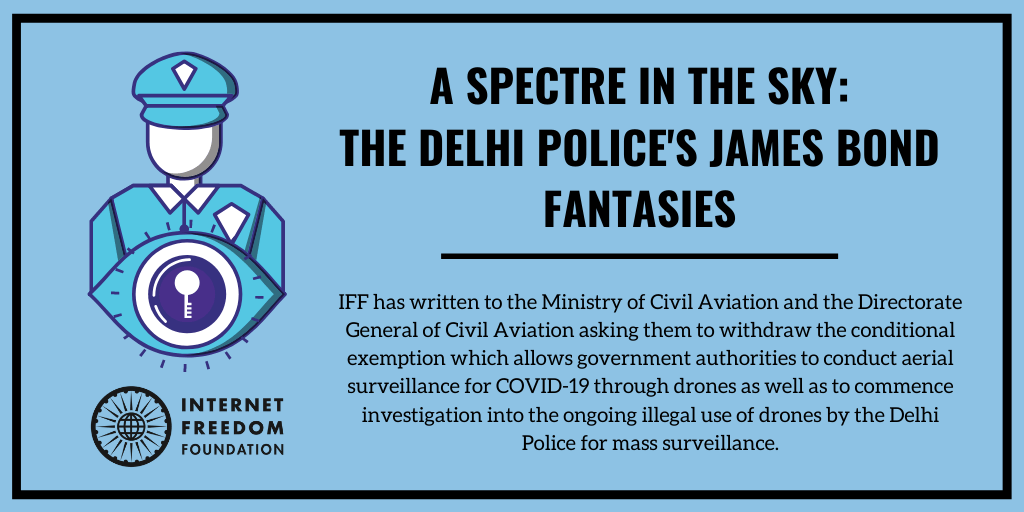
Tl;dr
In previous blogposts, we have pointed out that the Delhi Police has been using drones for conducting mass surveillance of individuals without authorization. On May 5, 2020 the Ministry of Civil Aviation (MCA) and the Directorate General of Civil Aviation (DGCA) allowed the use of Remotely Piloted Aircraft System (RPAS) or Drones by government entities for COVID-19 related operations by issuing a conditional exemption under Rule 160 of the Aircraft Rules, 1937. Under this conditional exemption, government entities are allowed to deploy drones to conduct aerial surveillance, aerial photography and public announcements related to COVID-19. We wrote to the MCA and DGCA asking them to recall the conditional exemption and to commence an investigation into the ongoing illegal use of drones by the Delhi Police for mass surveillance.
Illegal use of drones by the Delhi Police
Illegal use of drones by the Delhi Police first came to our attention in December, 2019 when the Delhi Police used them to surveill the protests that took place in the city. As a result, we sent a legal notice dated December 27, 2019 (Ref. No. 143/2019) to the DGCA on the illegal use of drones by the Delhi Police. In the legal notice, we asked the DGCA to seek independent legal opinion on the legality of drone use by the police, conduct an investigation into the ongoing use of drones by the Delhi Police and to take interim steps including sending an advisory to all Director General of Police about the CAR compliances for operating drones.
However, in February, 2020 we again came across reports that the Delhi Police had used drones to “monitor the situation” during the riots in North-East Delhi. As a result, we filed Right to Information requests (RTI Reference No. DEPOL/R/E/20/01005 dated February 14, 2020) with the Delhi Police asking them about their use of drones. Subsequently, in response (No.953/RTI Cell/North East District dated March 13, 2020) the North-East District, Seelampur division of the Delhi Police disclosed that they have been hiring drones from the open market through their Station House Officers (SHO). According to the response received, the purpose of hiring drones was to maintain law and order. Again we urged the Delhi Police to either to make any guidelines which allow and regulate use of drones by the police, if they exist, publicly available. If not, we urged the Delhi Police to immediately cease such use. (Read our blogpost containing an analysis of the Delhi Police RTI response here)
MCA & DGCA have introduced conditional exemptions for Government Authorities for COVID-19 surveillance
The MCA & DGCA have now allowed the use of drones by government entities for COVID-19 related operations by issuing a conditional exemption under Rule 160 of the Aircraft Rules, 1937 dated May 2, 2020. Under this conditional exemption, government entities are allowed to deploy drones to conduct aerial surveillance, aerial photography and public announcements related to COVID-19.
Aerial surveillance, as allowed by conditional exemption mentioned hereinabove, is violative of the decision in Justice K.S. Puttaswamy vs Union of India. This is because the intrusion which will be made by such use of drones into the privacy of individuals is disproportionate to the objective for which the step is being taken. Surveillance of COVID-19 patients is being done by the Government through various alternative measures such as contact tracing as well by serosurveillance which has commenced in the country. Aerial surveillance is thus an unnecessary and intrusive measure which will only create and further the threat and anxiety of mass surveillance in the country.
Recommendations by IFF
Recently, the Paris-based Conseil d’Etat (No.s 440442, 440445 dated May 18, 2020) banned drone surveillance by the Paris police for tracking people in public areas who were flouting social distancing norms as it was held to be against principles of privacy. It was held that such surveillance cannot be permitted until a privacy-friendly law is put in place or the drones are equipped with such technology that would make it impossible for the police to identify people through drone footage. Similarly, in the absence of a data protection law in India, allowing such surveillance would lead to disproportionate intrusion into the privacy of individuals.
Therefore, we recommend that:
- The conditional exemption to utilise drones for surveillance should be recalled.
- An independent privacy impact assessment should be conducted by the DGCA before granting permission to any government authority under the conditional exemption.
- The DGCA should institute an investigation into the illegal use of drones for mass surveillance by departments such as the Delhi Police.
- No retrospective sanction should be made for any illegal actions including those by the Delhi Police through the now notified rules.
Important Documents
- Representation to MCA & DGCA on Drone Surveillance dated June 23, 2020 (link)
- Public Notice by the MCA giving conditional exemption to Government Authorities for COVID-19 related drone operations (link)
- The DGCA must take urgent action against the illegal use of surveillance drones dated December 28, 2019 (link)
- Delhi Police admits to using drones on civilians without any publicly available legal guidelines in place dated March 27, 2020 (link)

